Good morningpublished at 08:50 GMT 21 February 2019
Welcome back to BBC Africa Live where we will bring you the latest news from around the continent.
Nigeria's police spokesperson issues warning over Saturday's poll
Nigerian election commission says presidential vote will go ahead
Zimbabwe starts trading 'new currency'
One killed in Mozambique as oil firm targeted
Botswana government report recommends elephant hunting should be reintroduced
Kenya court delays gay sex ruling
Algerians protest against Bouteflika's fifth-term plan
Damian Zane
Welcome back to BBC Africa Live where we will bring you the latest news from around the continent.
We'll be back on Thursday
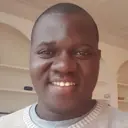 Dickens Olewe
Dickens Olewe
BBC Africa Live
That's it from BBC Africa Live for now. You can follow the latest news on the BBC Africa website or listen to the Africa Today podcast.
A reminder of our proverb of the day:
Quote MessageIf you're going to grow tall your legs will get thin."
A Yoruba proverb sent by Deji Adewole, Aba, Nigeria
And we leave you with this snapshot of a young man from Makokoba township in Zimbabwe's southern city Bulawayo posing for a picture while carrying home a live chicken in time for it to be prepared for supper.
Allow Instagram content?
This article contains content provided by Instagram. We ask for your permission before anything is loaded, as they may be using cookies and other technologies. You may want to read Meta’s Instagram cookie policy, external and privacy policy, external before accepting. To view this content choose ‘accept and continue’.
Kalkidan Yibeltal
BBC Amharic Service, Addis Ababa
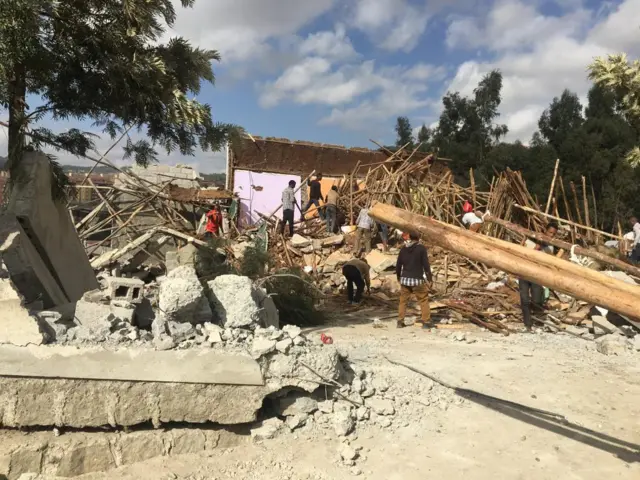
Authorities in the outskirts of the Ethiopian capital, Addis Ababa, have started demolishing houses they deem illegal.
Local media report more than 10,000 houses will eventually be demolished following orders from Legetafo-Legedadi town administration in Oromia region which is adjacent to the capital.
The operation has left several families homeless, some of whom have sought shelter in churches.
Speaking to the BBC, some residents admit their houses were built without authorisation.
However, they complain that they have not been provided with alternative accommodation.
The plot of land being cleared away is planned to be a public park.
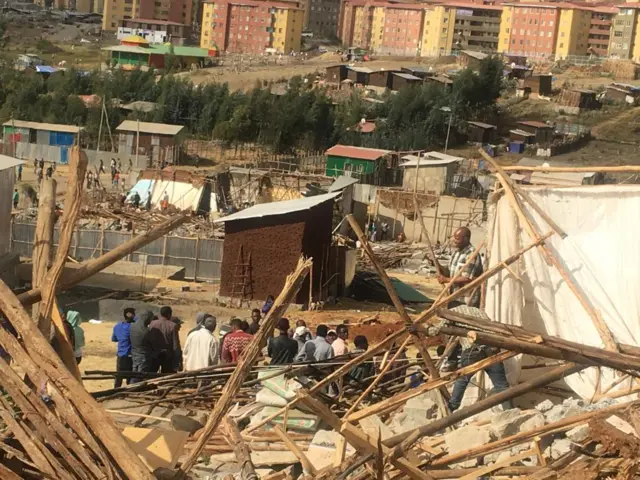
Opposition parties in Zambia say they are reporting the country's President, Edgar Lungu, and several governing party officials, to the International Criminal Court in The Hague for instigating political violence.
At a press conference in the capital, Lusaka, 10 opposition politicians accused President Lungu and Zambia's Home Affairs Minister, Stephen Kampyongo, of ordering militias to attack the opposition during recent by-election campaigns.
No-one from the governing party has responded to the allegations.
The main opposition leader, Hakainde Hichilema, said last week that police had tried to assassinate him while he was out campaigning.
Human rights groups say oppression has increased during President Lungu's four years in office.
The Association of Persons with Albinism in Malawi has announced its withdrawal from a government task force that was set up to protect its members.
It says the government is not doing enough to protect the country's estimated 15,000 people with albinism and wants it to pave the way for them to seek asylum abroad.
Malawi is one of several African countries where people with albinism are targeted for ritual killings fuelled by superstitious beliefs that their bones and body parts can be used to make charms that bring good luck or make people rich.
The chairman of task force Dr Hetherwick Ntaba spoke to the BBC's Focus on Africa programme about the development.
Listen:
Malawi's Association of Persons with Albinism announced its withdrawal from the initiative
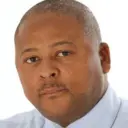 Milton Nkosi
Milton Nkosi
BBC Africa, Johannesburg
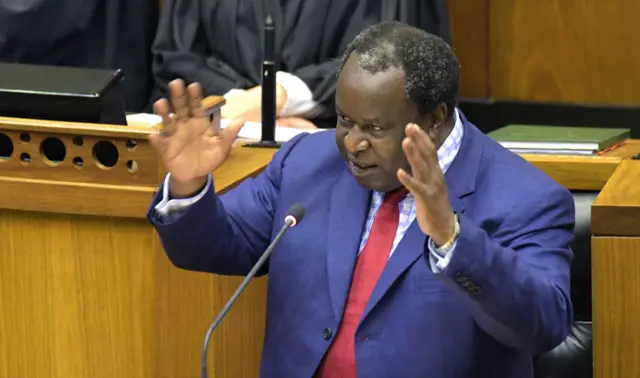 Image source, AFP
Image source, AFPFinance Minister Tito Mboweni delivers his 2019 budget speech in parliament
South Africans are caught between a rock and a hard place following the reading of the 2019 budget speech.
Finance Minister Tito Mboweni warned that there are tough times ahead with economic growth predicted to be at 0.7%.
Many South Africans like pensioner Betty Sibeko, who lives in Soweto, the country’s largest township, are struggling.
She told me she can barely make ends meet from her 1,600 rand ($114;£87) monthly social grant which millions like her receive.
Mr Mboweni offered a life line to the country’s power utility Eskom which plunged the country into darkness last week.
He announced that Eskom will receive $1.63bn (£1.2bn) over the next three years but added that the utility firm will have to pay back the money.
The budget also increased taxes on fuel and luxuries such as whiskey and cigars.
Influential players in the private sector welcomed the budget saying that it was not populist, which could have been easy to do in an election year.
The leader of the opposition Democratic Alliance, Mmusi Maimane, said it was a “lipstick budget”, which looked good on the outside but with no job creating solutions.
Mr Mboweni hopes that his speech will keep the ratings agencies happy.
Government debt currently stands at 59% of GDP. There were fears that they would downgrade the country to junk status if debt had risen to over 60% of GDP ratio.
Mr Mboweni knows that he cannot celebrate until Moody’s, one of the three major credit rating agencies, makes its pronouncement.
Possibly the least known style of African music is African Art Music which can trace its origins to the last century with composers such as Fela Sowande, who is considered the father of the of the genre and the likes of Ayo Bankole, Joshua Uzoigwe and Akin Euba.
The combined traditional music with the Western classical style.
But now this "fusion" of music is enjoying something of a revival, and it's the focus of a series of concerts in London - allowing a new audience to discover and enjoy traditional music in a classical idiom.
Listen to Nigerian/Romanian pianist Rebeca Omordi talk about the genre's origins on the BBC's Focus on Africa programme.
Zimbabwe’s central bank has said that it will no longer peg the bond note to the US dollar.
The country does not have an official currency and has been using the US dollar and other foreign currencies since 2009, when it ditched the Zimbabwe dollar after hyperinflation destroyed its value.
It introduced bond notes in 2016 to make up for a shortage of dollar cash. Originally each bond dollar was worth $1.
But now Zimbabweans will be able to trade the bond notes at a market determined rate. This is fact reflects the reality that one bond note was worth less than $1 on the black market.
The central bank hopes the move will end the black market trade of the US dollar.
Many believe adding the bond note to the basket of currencies is the first step towards re-establishing the Zimbabwe dollar.
Read more:
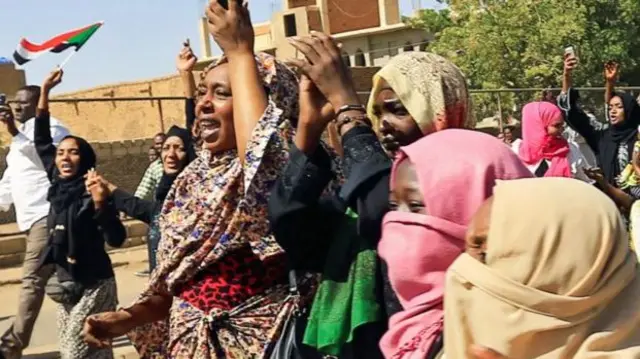 Image source, Reuters
Image source, ReutersUnprecedented numbers of women are taking to the streets to join daily nationwide protests that erupted in Sudan in mid-December.
Despite a violent crackdown by the security forces and reports of sexual harassment, they remain undeterred.
They are fighting back against these alleged abuses using a private all-women Facebook group that was set up three years ago to identify cheating husbands and follow their crushes.
Now photos taken at protests of suspected National Intelligence and Security Service (NISS) agents are shared in the group, called Minbar-Shat, which in Sudanese Arabic means "Extreme Love".
If anyone is able to identify or knows anything about them - they share these details, sometimes even giving names, addresses and phone numbers.
This has led to some protesters writing graffiti on houses saying a known NISS agent lives there.
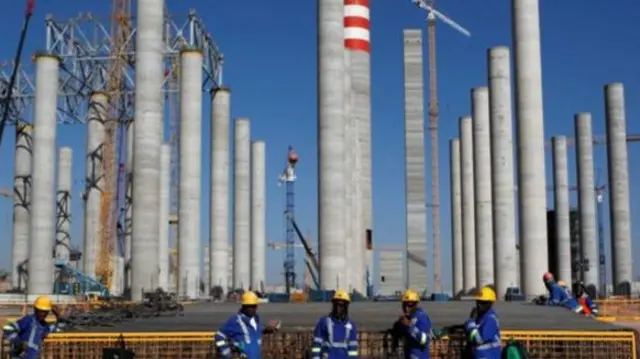 Image source, Reuters
Image source, ReutersThe South African government will inject $1.63bn (£1.2bn) a year to the cash-strapped power utility company Eskom over the next three years, according to the country's budget.
The announcement comes a week after South African homes, offices and businesses endured a week of daily power cuts, designed to prevent a total collapse of the overstretched electricity grid.
The cash injection is the first step of a plan announced by President Cyril Ramaphosa this month to split Eskom into three entities.
More support to Eskom would depend on the country's economic growth, electricity tariffs and the implementation of the company's strategy, the treasury said in its 2019 budget statement.
The government will however not take on $7bn of debt as requested by the company.
Authorities in Kenya say they will launch an operation to track 74,000 people who have defaulted on student loans, privately owned Daily Nation reports. , external
The Higher Education Loans Board (Helb), a state agency, seeks to recover some 7.2bn Kenya shillings ($72m;£55m).
Education Minister Amina Mohamed said on Wednesday that the ministry will work with police to track the defaulters.
“We are also going to partner with our law enforcement agencies to track down those holding jobs and yet are reluctant to stand up to be counted as responsible and patriotic citizens who honour their debts,” she said.
The head of Helb, Charles Ringera, said the agency will work with the foreign ministry to track defaulters living outside the country.
Ms Mohamed said the annual Helb student loan budget had grown from $45m financing 110,000 students in 2012 to $109m for 250,000 students in the 2017/18 financial year.
She said 53% of Helb budget is funded by the government with loan recovery covering the rest.
People who borrow money from Helb are expected to start repaying after they graduate.
Allow X content?
This article contains content provided by X. We ask for your permission before anything is loaded, as they may be using cookies and other technologies. You may want to read X’s cookie policy, external and privacy policy, external before accepting. To view this content choose ‘accept and continue’.
The UN's Commission on Human Rights in South Sudan has expressed outrage over renewed fighting in the country which has forced thousands of people to flee their homes.
It said armed men were attacking villages, taking women as sexual slaves and setting fire to homes, often with people inside.
It says there has been a surge in the number of rapes in South Sudan and has called on the government and all other forces to respect the peace agreement signed last year.
The commission stressed the need for a special court to be set up as well as a Commission for Truth, Reconciliation and Healing in order to end impunity and help build sustainable peace.
President Salva Kiir and his former deputy, Riek Machar, signed a peace agreement last year to end the civil war which broke out in 2013.
 BBC World Service
BBC World Service
Egypt has executed nine men convicted of killing the country's public prosecutor, Hesham Barakat, in 2015.
The human rights group Amnesty International had appealed for a stay of execution saying the defendants' confessions were made under duress.
Last year Egypt's highest court upheld the death sentences on the nine men and commuted to life imprisonment the death sentences of six others.
Mr Barakat was killed when his convoy was hit by a car bomb blast in Cairo.
Nigeria is to hold a delayed presidential election this Saturday after the initial vote was rescheduled in a dramatic overnight press conference, five hours before polls were due to have opened.
The last-minute cancellation surprised the country and inconvenienced thousands of Nigerians who had travelled a long way to cast their votes.
It has also cost the economy $1.5bn (£1.15bn), according to the Lagos Chamber of Commerce and Industry.
The Independent National Electoral Commission (Inec) has given several reasons for the delay, including attempted sabotage and logistical issues such as bad weather and problems with delivering the ballot papers.
In a statement issued on the day of the postponement, the All Progressives Congress (APC) said the People's Democratic Party (PDP) wanted to halt the momentum of its candidate, President Muhammadu Buhari.
The PDP, whose presidential contender is Atiku Abubakar, on the other hand said Inec had delayed the election to create "the space to perfect their rigging plans".
Some analysts say the postponement is likely to harm both parties equally, as their supporters who had travelled home to vote last week will be unable to make another journey this weekend.
Read the full analysis on the BBC website
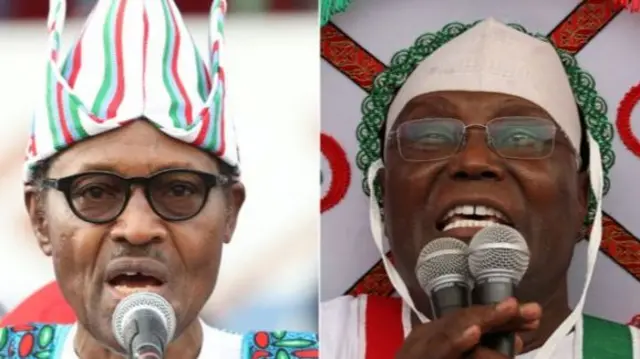 Image source, Reuters
Image source, ReutersPresident Muhammadu Buhari (l) is expected to face a strong challenge from Atiku Abubakar (r)
Prime Ndikumagenge
BBC Africa
The Rwandan government wants the parliament to pass a bill banning single use plastics in the country to protect environment.
The draft bill suggests a two year moratorium for companies to stop manufacturing single use plastics.
Plastics were first banned in Rwanda back in 2008 but some plastic materials are still used, including mineral water and juice bottles, straws in bars and hotels and single use dishes. The government wants to take a further move to ban these too.
A bill will be sent to parliament for a vote.
Somalia's President Mohamed Abdullahi Farmajo will not be travelling to Ethiopia for an historic meeting with the leader his country's northern breakaway province of Somaliland, a VOA journalist has tweeted.
President Farmajo and Muse Bihi Abdi were set to be hosted by Ethiopia's Prime Minister Abiy Ahmed, privately-owned Addis Standard reported.
It will be the "first ever high-level meeting" between the two countries, it said.
The Somalia leader has "agreed in principle" for the talks.
Allow X content?
This article contains content provided by X. We ask for your permission before anything is loaded, as they may be using cookies and other technologies. You may want to read X’s cookie policy, external and privacy policy, external before accepting. To view this content choose ‘accept and continue’.
Mr Abdi has reportedly set off for Addis Ababa.
Allow X content?
This article contains content provided by X. We ask for your permission before anything is loaded, as they may be using cookies and other technologies. You may want to read X’s cookie policy, external and privacy policy, external before accepting. To view this content choose ‘accept and continue’.
Somaliland declared independence after the overthrow of Somali military dictator Siad Barre in 1991.
The move followed a secessionist struggle during which Siad Barre's forces pursued rebel guerrillas in the territory. Tens of thousands of people were killed and towns were flattened.
Though not internationally recognised, Somaliland has a working political system, government institutions, a police force and its own currency.
Ugandans have abandoned the internet in the millions after the government imposed a social media tax last year, the Uganda Communications Commission (UCC) has said.
President Yoweri Museveni had pushed for the taxes to boost government revenue and to end "gossip" on WhatsApp, Facebook and Twitter.
Subscribers have to pay a tax for using social media tax and transferring money through mobile phone payments set at 200 Ugandan shillings [$0.05, £0.04] per day.
The UCC said internet subscription declined by more than 2.5 million users and money being transferred through mobile phones payments also fell by $1.2m (£920,000) since July 2018.
“The decline in the amount of business could partly be explained by the introduction of mobile money tax,” the UCC said.
The BBC's Newsday presenter Alan Kasujja spoke to technology entrepreneur Albert Mucunguzi about the effects of the social media tax.
A government tax has cut the numbers of social media users
Gosa Taffese has a beehive in his front room and the insects follow him on his travels as well.
Dubbed the “father of bees” by locals in Ethiopia's Oromia region, he says it's a mystery why the insects are attracted to him.
Video journalist:Yadeta Berhanu, BBC News Oromo
The mystery behind Ethiopia's 'father of bees'
Uganda's ruling party has endorsed President Yoweri Museveni as its candidate for the 2021 elections.
This means the 74-year-old leader, who came to power in 1986, will be running for a sixth term.
The National Resistance Movement (NRM) agreed, in a meeting chaired by Mr Museveni on Wednesday, that he should "continue leading the movement and the state in 2021 and beyond to eliminate bottlenecks to transformation".
Mr Museveni once said leaders who "overstayed" in office were the root of Africa's problems.
However, he said, while running for a fifth term in 2016, that it was not the right time for him to leave as he still had work to do.
His candidacy for Uganda's next election comes after he signed a 2017 bill that scrapped the presidential age limit of 75.
Uganda's Supreme Court began hearing a petition last month to challenge this decision.
Allow X content?
This article contains content provided by X. We ask for your permission before anything is loaded, as they may be using cookies and other technologies. You may want to read X’s cookie policy, external and privacy policy, external before accepting. To view this content choose ‘accept and continue’.
Our African proverb of the day:
Quote MessageIf you're going to grow tall your legs will get thin."
A Yoruba proverb sent by Deji Adewole, Aba, Nigeria.